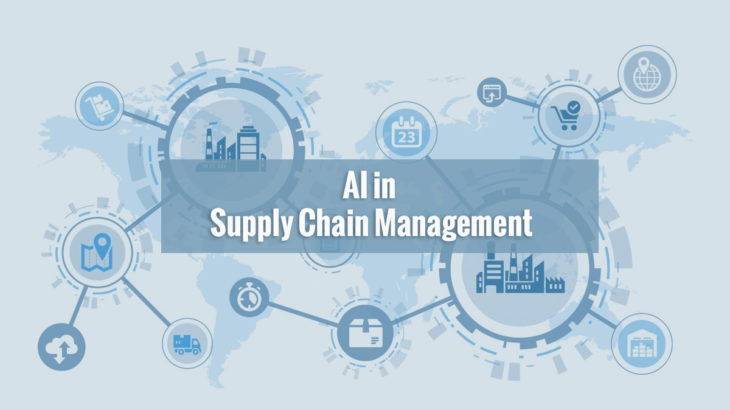In this two part series of articles, we take a look at the effect of AI on Supply Chain Management (SCM) and its two components Logistics and Warehousing, and its impact on Commercial Real Estate industry. This article deals with SCM which involves managing the entire gamut of activities such as buying, selling and/or leasing of land.
The future of businesses is not just about adopting Artificial Intelligence (AI) technology; it is about being ahead and gaining a significant advantage over competitors. Amongst other business applications, Supply Chain is also following suit giving rise to a new era in its optimization; where the supply chain systems can think, analyze vast amounts of data, predict and forecast findings, and present insights.
The outlook:
As AI or cognitive technology, as its otherwise known evolves, it is expected to steer SCM to the path of complete automation in the next two years. The AI platform optimizes performance by comparing and analyzing all available data and best practices, to provide insights and aid decision making process. This not only assists in creating a smart, responsive and customer-centric supply chain, but also enhances safety, effectiveness and offers complete transparency to the various supply chain partners. AI can predict demand in the supply chain, optimize routes, and control ‘network management.’ Further, inventory can be better handled leading to an increase in revenues and environmental functions for the existing infrastructure. It can further automate and hasten the brokerage process thereby saving costs and improving error margins.
Underlying issues:
Price optimization and execution, elimination of manual errors and operational expenses can reduce with the advent of AI in Supply Chain Management (SCM). However, AI technology is still not being utilized to its full potential. This is primarily due to reasons such as external partners where data issues arise from collection points such as suppliers, distributors, manufacturers, resellers etc. According to a survey by JDA and KPMG, “More than 50 percent of manufacturers and retailers state the need for real-time product visibility as the leading driver in digital supply chain investment.”
Retailers: Customer expectation drives the retail investment in the supply chain. Retailers are banking on IoT, AI, ML and cloud for real-time data. For them, the leading drivers in supply chain investment are real-time product visibility (57 percent), end-to-end traceability (53 percent), and the ability to manage new fulfillment nodes (50 percent). Top inhibitors are management commitment (70 percent), limited IT budget (60 percent), and no integrated strategy (30 percent).
Manufacturers: They view Blockchain and autonomous vehicles as the AI technologies driving their supply chain. Their leading drivers in supply chain investment are real-time product visibility (50 percent), the need to innovate faster (40 percent), and lowering cost to serve through improved planning (33 percent). It is the execution structure and change management capabilities that hold them back, such as resistance to change (57 percent), complicated decision making (40 percent), and management commitment/data security (37 percent).
Ways in which AI is driving this change
- Chatbots: The latest addition to many organizations, in the supply chain they can assist in streamlining procurement activities and answer queries pertaining to suppliers. Other applications include placing purchase or order requests, filling invoices and also updating sellers on compliance requirements.
- Machine Learning (ML): If ML is applied in Supply Chain Planning with the correct parameters of data sets, it can assist in accurately forecasting demand, supply, and inventory. This will enhance agility and optimization of material. ML can also provide a self-improving forecast on warehouse management, help avoid over/under stocking of goods, and possibly formulate scheduling decisions. Take for instance, Danone using machine learning for analyzing demand resulting in a decrease in forecast errors and loss of sales.
- Autonomous vehicles: Use of autonomous vehicles for transportation is expected to create a massive impact. These vehicles are expected to lower accident rates especially on long haul drives, reduce labor costs and increase environmental friendly procedures leading to quicker and precise shipping thereby reducing lead time. Eg. Siemens is using AI and automation for their production lines which does not require human supervision for weeks.
- Natural Language Processing (NLP) for data refining and creating robust data: NLP can decode big data in a streamlined manner. It can also eliminate language barriers between suppliers by reorganizing audit and compliance actions.
- ML and Predictive Analytics for Supplier selection and Supplier Relationship Management: Partnering with the right suppliers is critical to enhancing the efficacy of supply chan. SRM actions that give data on supplier credibility, assessments and audits, provide information for deciding on a supplier. Also based on users requirements, best supplier scenarios can be predicted via ML.
To leverage on the advantage the new technology offers, data accuracy forms the cornerstone for planning and decision making in SCM or any form of the predictive analysis, be it forecasting, fleet routing or optimization of inventory.
